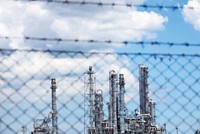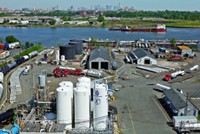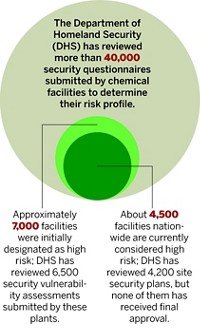Advertisement
Grab your lab coat. Let's get started
Welcome!
Welcome!
Create an account below to get 6 C&EN articles per month, receive newsletters and more - all free.
It seems this is your first time logging in online. Please enter the following information to continue.
As an ACS member you automatically get access to this site. All we need is few more details to create your reading experience.
Not you? Sign in with a different account.
Not you? Sign in with a different account.
ERROR 1
ERROR 1
ERROR 2
ERROR 2
ERROR 2
ERROR 2
ERROR 2
Password and Confirm password must match.
If you have an ACS member number, please enter it here so we can link this account to your membership. (optional)
ERROR 2
ACS values your privacy. By submitting your information, you are gaining access to C&EN and subscribing to our weekly newsletter. We use the information you provide to make your reading experience better, and we will never sell your data to third party members.
Policy
Inherently Safer Technology
No Middle Ground In Senate Debate
by Jeff Johnson
July 3, 2006
| A version of this story appeared in
Volume 84, Issue 27
The gulf could not have been wider at a June 21 hearing before the Senate Environment & Public Works Committee. Republican senators who dislike inherently safer technology (IST) made clear that they really detest it; Democrats who want IST said with equal fervor that it is the surest and cheapest way out of the chemical plant security conundrum that has plagued Congress since the Sept. 11, 2001, terrorist attacks.
Although ostensibly a hearing, senators' statements took up nearly all of the hour-and-a-half session. Six witnesses each got five minutes or less to testify, took a handful of brief questions, and were ushered out the door. The debate made obvious that this Congress is not likely to reach any compromise needed to pass a plant security bill that carries even a hint of IST.
Inherently safer technology or design is a concept pioneered in the 1970s by British chemical engineer Trevor Kletz. He believes it is better to design chemical processes that eliminate chemical plant hazards from the get-go than to engineer technological add-ons later to try to control them.
"The very best way to prevent an explosion is simply to replace the material that explodes," he told C&EN years ago. Material substitution of nonhazardous for hazardous chemicals is one key way to do this, he said (C&EN, Feb. 3, 2003, page 23).
He acknowdeged this substitution can't always be done: Sometimes a process is fundamentally hazardous and cannot be replaced−such as flying−and then hazards must be controlled. Consequently, mandating IST goes too far, he said. But still, he stressed that IST is no theory or vague concept. It was born from his lifelong experience investigating the tragedies of chemical plant explosions around the world. He made a strong pitch for the need to overcome chemical industry reluctance to apply the concept to the workplace.
Even before 9/11, unions and community and environmental groups had tried to tie their desire to phase out hazardous chemicals to regulations encouraging greater applications of IST. And industry fought back hard to block regulations, arguing that government has no business telling industry how to manufacture products or use chemicals. Despite laws encouraging IST in New Jersey and California's Contra Costa County, the chemical industry has kept mandates for IST at bay.
At the Senate hearing, Sen. Joseph R. Biden Jr. (D-Del.) told the other senators with a laugh that their debate reminded him of "the good old days" when the Judiciary Committee, of which he is a longtime member, debated abortion. As he wound up his statement, Biden, who appeared as a witness in support of IST, was quickly cut off by Sen. James M. Inhofe (R-Okla.), an IST opponent and chairman of the Environment & Public Works Committee.
For Inhofe, IST is an "environmental concept" that has been pushed for more than a decade by "the extremist environmental community" when trying to ban chlorine. "It was only after 9/11 that they decided to play upon the fears of the nation and repackage IST as a panacea to all our security problems," he said.
Inhofe has placed a block on Senate consideration of plant security legislation that cleared the Senate Homeland Security & Government Affairs Committee on June 15. He said he is concerned that the bill may provide a "back door" way to require IST. He said so even though a provision requiring the Department of Homeland Security to consider IST for "high risk" facilities was voted down by the committee. That provision did not mandate IST-it would have called for consideration of the technology only if it can be shown to be cost-effective, to be feasible, and to improve security (C&EN, June 26, page 11).
Three times since the 9/11 attacks, a chemical plant security bill has cleared Senate committees, but none has been brought to the floor. Democrats blame Inhofe; Inhofe blames some in Congress who, he said, are insisting that security legislation must include provisions allowing the Department of Homeland Security (DHS) to mandate IST.
Inhofe said he supports plant security legislation but believes a "determined effort" by the Bush Administration to protect the nation's critical infrastructure against terrorists is under way. He applauded action by DHS and the chemical industry to enhance plant security and was joined in this view by Sens. Christopher S. Bond (R-Mo.) and George V. Voinovich (R-Ohio).
They stressed that government bureaucrats have no understanding of how security should be applied at a chemical plant and warned that IST would require changes that could upset manufacturing.
On the other side, the Environment & Public Works Committee's ranking minority member, Sen. James M. Jeffords (I-Vt.), called chemical plants "pre-positioned weapons of mass destruction." He said the Bush Administration has done "almost nothing to address this glaring vulnerability" in the five years since the 9/11 attacks.
Jeffords, supported by Sens. Frank Lautenberg (D-N.J.) and Barack Obama (D-Ill.), countered that an attack at any one of more than 100 chemical facilities across the nation has the potential to kill or injure 1 million people and that many companies are already implementing IST as a voluntary measure without being driven by regulations.
IST opponents responded that if companies are doing it voluntarily, no regulations are needed.
The split even ran through the committee's take on a recent National Research Council report on chemical plant security. Lautenberg said the report concluded that "the most desirable solution to preventing chemical releases is to reduce or eliminate the hazard where possible"; Inhofe fired back that the study did not recommend IST be mandated. And on and on they went.
If companies want to cut their use of toxic chemicals as a security measure, which many already have done, it will be up to them to do it. If Congress wants to help, it will be left to another Congress to show the way.
MORE ON THIS STORY
Inherently Safer Technology
No Middle Ground In Senate Debate (page 26)
Terrorism And The Chemical Industry
Study suggests Homeland Security Department support a panoply of research to protect this sector (page 25)





Join the conversation
Contact the reporter
Submit a Letter to the Editor for publication
Engage with us on Twitter